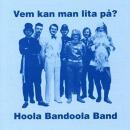Medan den rikes barn blir feta
dör den fattiges barn av svält
Fast dom säger att vi är lika
så är det alltid dom som har rätt
Dom säger, vi sitter i samma båt
både styrman och matros
Men hur jag än försöker och bär mej åt
så är det alltid jag som ror
så är det alltid jag som ror
Om friheten för den lame
är att få gå precis vart han vill
och om den stumme kan bli kejsare
om han bara säger till
ja, då är skomakarpojkens frihet
att få stanna vid sin läst
och det är frihet för den fattige
att kunna köpa vad som helst
att kunna köpa vad som helst
Dom säger att vi hör samman
att vi är bröder allihop
att vi ska lära oss att leva med varann
Men när tiderna blir knappa
och man ska prova det som band
då är det slut på allt tal om broderskap
och man snor åt sej vad man kan
Och dom säger att vi hör samman
att vi är bröder allihop
att vi ska lära oss att leva med varann
Men när tiderna blir knappa
och man ska prova det som band
då är det slut på allt tal om broderskap
och man snor åt sej vad man kan
Så medan den rikes barn blir feta
dör den fattiges barn av svält
Fast dom säger att vi är lika
så är det alltid dom som har rätt
Dom säger, vi sitter i samma båt
både styrman och matros
Men hur jag än försöker och bär mej åt
så är det alltid jag som ror
så är det alltid jag som ror.
dör den fattiges barn av svält
Fast dom säger att vi är lika
så är det alltid dom som har rätt
Dom säger, vi sitter i samma båt
både styrman och matros
Men hur jag än försöker och bär mej åt
så är det alltid jag som ror
så är det alltid jag som ror
Om friheten för den lame
är att få gå precis vart han vill
och om den stumme kan bli kejsare
om han bara säger till
ja, då är skomakarpojkens frihet
att få stanna vid sin läst
och det är frihet för den fattige
att kunna köpa vad som helst
att kunna köpa vad som helst
Dom säger att vi hör samman
att vi är bröder allihop
att vi ska lära oss att leva med varann
Men när tiderna blir knappa
och man ska prova det som band
då är det slut på allt tal om broderskap
och man snor åt sej vad man kan
Och dom säger att vi hör samman
att vi är bröder allihop
att vi ska lära oss att leva med varann
Men när tiderna blir knappa
och man ska prova det som band
då är det slut på allt tal om broderskap
och man snor åt sej vad man kan
Så medan den rikes barn blir feta
dör den fattiges barn av svält
Fast dom säger att vi är lika
så är det alltid dom som har rätt
Dom säger, vi sitter i samma båt
både styrman och matros
Men hur jag än försöker och bär mej åt
så är det alltid jag som ror
så är det alltid jag som ror.
Contributed by Riccardo Venturi - 2018/7/12 - 11:29
Language: Italian
Traduzione italiana / Italian translation / Traduction italienne / Italiensk översättning / Italiankielinen käännös: Riccardo Venturi
12-7-2018 11:29
12-7-2018 11:29
1789+0
Mentre i figli del ricco ingrassano
quelli del povero crepano di fame
Anche se dicono che siamo uguali
è sempre loro che hanno ragione
Dicono che stiamo sulla stessa barca
sia il comandante che il marinaio
ma come provo a fare qualsiasi cosa
poi sono sempre io che remo
poi sono sempre io che remo
Se la libertà per il paralitico
è poter andare dove vuole
e se il muto può diventare
imperatore, se solo lo dice
sí, allora il garzone di un calzolaio
è libero di starsene alla sua forma
e pure il povero è liberissimo
di poter comprare qualsiasi cosa
di poter comprare qualsiasi cosa
Dicono che siamo solidali,
che siamo tutti quanti fratelli,
che impareremo a vivere insieme
Ma quando arrivan le vacche magre
e si deve provare in gruppo [1]
allora fine di ogni discorso di fraternità
e si tira come si può l'acqua al proprio mulino
Dicono che siamo solidali,
che siamo tutti quanti fratelli,
che impareremo a vivere insieme
Ma quando arrivan le vacche magre
e si deve provare in gruppo
allora fine di ogni discorso di fraternità
e si tira come si può l'acqua al proprio mulino
E quindi, mentre i figli del ricco ingrassano
quelli del povero crepano di fame
Anche se dicono che siamo uguali
è sempre loro che hanno ragione
Dicono che stiamo sulla stessa barca
sia il comandante che il marinaio
ma come provo a fare qualsiasi cosa
poi sono sempre io che remo
poi sono sempre io che remo.
Mentre i figli del ricco ingrassano
quelli del povero crepano di fame
Anche se dicono che siamo uguali
è sempre loro che hanno ragione
Dicono che stiamo sulla stessa barca
sia il comandante che il marinaio
ma come provo a fare qualsiasi cosa
poi sono sempre io che remo
poi sono sempre io che remo
Se la libertà per il paralitico
è poter andare dove vuole
e se il muto può diventare
imperatore, se solo lo dice
sí, allora il garzone di un calzolaio
è libero di starsene alla sua forma
e pure il povero è liberissimo
di poter comprare qualsiasi cosa
di poter comprare qualsiasi cosa
Dicono che siamo solidali,
che siamo tutti quanti fratelli,
che impareremo a vivere insieme
Ma quando arrivan le vacche magre
e si deve provare in gruppo [1]
allora fine di ogni discorso di fraternità
e si tira come si può l'acqua al proprio mulino
Dicono che siamo solidali,
che siamo tutti quanti fratelli,
che impareremo a vivere insieme
Ma quando arrivan le vacche magre
e si deve provare in gruppo
allora fine di ogni discorso di fraternità
e si tira come si può l'acqua al proprio mulino
E quindi, mentre i figli del ricco ingrassano
quelli del povero crepano di fame
Anche se dicono che siamo uguali
è sempre loro che hanno ragione
Dicono che stiamo sulla stessa barca
sia il comandante che il marinaio
ma come provo a fare qualsiasi cosa
poi sono sempre io che remo
poi sono sempre io che remo.
[1] Anche nell'originale svedese, l'espressione prova det som band risente senz'altro della terminologia di un complesso musicale, appunto di un "gruppo" o di una "band" come si dice adesso (in italiano, il termine "complesso" è ormai desueto e generazionale).
Language: English
English translation by Ceil Herman
Versione inglese di Ceil Herman
Mikael Wiehe commented (från Sångerna 2002) on his website
"Ännu har vi inte förverkligat den franska revolutionens ideal om frihet, jämlikhet och broderskap."
(We still haven't implemented the French Revolution's ideal of freedom, equality, and fraternity.")
Versione inglese di Ceil Herman
Mikael Wiehe commented (från Sångerna 2002) on his website
"Ännu har vi inte förverkligat den franska revolutionens ideal om frihet, jämlikhet och broderskap."
(We still haven't implemented the French Revolution's ideal of freedom, equality, and fraternity.")
1789 + 0
While the richest children become fat
The poorest children die of hunger
and although they say that we are alike,
it is always they who are right.
They say we are sitting in the same boat
both the officer and the sailors.
But how I then try and carry myself
so it's always I who row.
So it is always I who row.
If freedom for the lame one
is to walk precisely where he wants,
and if the silent can be emperor
if he only says so,
yes, then is the shoemaker's boy freedom
to stay by his father's trade
and it is freedom for the poor
that they can buy what they want.
That they can buy what they want.
They say we belong together,
that we are all brothers,
that we will learn to live with each other.
But when the times become scarce
and you will try it like a bond,
then all talk about brotherhood ends
and you take what you can.
While the richest children become fat
The poorest children die of hunger
and although they say that we are alike,
it is always they who are right.
They say we are sitting in the same boat
both the officer and the sailors.
But how I then try and carry myself
so it's always I who row.
So it is always I who row.
If freedom for the lame one
is to walk precisely where he wants,
and if the silent can be emperor
if he only says so,
yes, then is the shoemaker's boy freedom
to stay by his father's trade
and it is freedom for the poor
that they can buy what they want.
That they can buy what they want.
They say we belong together,
that we are all brothers,
that we will learn to live with each other.
But when the times become scarce
and you will try it like a bond,
then all talk about brotherhood ends
and you take what you can.
Contributed by Ceil Herman - 2018/10/11 - 01:37
Language: Finnish
Traduzione finlandese / Finnish translation / Traduction finnoise / Finsk översättning / Suomennos: Juha Rämö
1789 + 0 [*]
Siinä missä rikkaiden lapset lihoavat,
köyhien lapset kuolevat nälkään.
Ne sanovat, että olemme yhdenvertaisia,
mutta ne ovat kuitenkin aina oikeassa.
Ne sanovat, että olemme samassa veneessä
niin perämiehet kuin matruusitkin,
mutta vaikka kuinka yrittäisin,
minä olen aina se, joka soutaa,
olen aina se, joka soutaa.
Jos heikon vapaus on sitä,
että hän voi mennä minne haluaa,
ja jos mykästä voi tulla keisari
pelkästään käskemällä,
niin silloin suutarin pojan vapaus
on sitä, että hän pysyy lestissään
ja köyhän vapaus sitä,
että voi ostaa mitä tahansa,
voi ostaa mitä tahansa.
Ne sanovat, että kuulumme yhteen,
että olemme kaikki veljiä,
että meidän on opittava elämään yhdessä.
Mutta kun koittavat niukat ajat
ja yhteenkuuluvuus punnitaan,
puheet veljeydestä vaikenevat
ja jokainen on omillaan.
Ja ne sanovat, että kuulumme yhteen,
että olemme kaikki veljiä,
että meidän on opittava elämään yhdessä.
Mutta kun koittavat niukat ajat
ja yhteenkuuluvuus punnitaan,
puheet veljeydestä vaikenevat
ja jokainen on omillaan.
Siinä missä rikkaiden lapset siis lihoavat,
köyhien lapset kuolevat nälkään.
Ne sanovat, että olemme yhdenvertaisia,
mutta ne ovat kuitenkin aina oikeassa.
Ne sanovat, että olemme samassa veneessä
niin perämiehet kuin matruusitkin,
mutta vaikka kuinka yrittäisin,
minä olen aina se, joka soutaa,
olen aina se, joka soutaa.
Siinä missä rikkaiden lapset lihoavat,
köyhien lapset kuolevat nälkään.
Ne sanovat, että olemme yhdenvertaisia,
mutta ne ovat kuitenkin aina oikeassa.
Ne sanovat, että olemme samassa veneessä
niin perämiehet kuin matruusitkin,
mutta vaikka kuinka yrittäisin,
minä olen aina se, joka soutaa,
olen aina se, joka soutaa.
Jos heikon vapaus on sitä,
että hän voi mennä minne haluaa,
ja jos mykästä voi tulla keisari
pelkästään käskemällä,
niin silloin suutarin pojan vapaus
on sitä, että hän pysyy lestissään
ja köyhän vapaus sitä,
että voi ostaa mitä tahansa,
voi ostaa mitä tahansa.
Ne sanovat, että kuulumme yhteen,
että olemme kaikki veljiä,
että meidän on opittava elämään yhdessä.
Mutta kun koittavat niukat ajat
ja yhteenkuuluvuus punnitaan,
puheet veljeydestä vaikenevat
ja jokainen on omillaan.
Ja ne sanovat, että kuulumme yhteen,
että olemme kaikki veljiä,
että meidän on opittava elämään yhdessä.
Mutta kun koittavat niukat ajat
ja yhteenkuuluvuus punnitaan,
puheet veljeydestä vaikenevat
ja jokainen on omillaan.
Siinä missä rikkaiden lapset siis lihoavat,
köyhien lapset kuolevat nälkään.
Ne sanovat, että olemme yhdenvertaisia,
mutta ne ovat kuitenkin aina oikeassa.
Ne sanovat, että olemme samassa veneessä
niin perämiehet kuin matruusitkin,
mutta vaikka kuinka yrittäisin,
minä olen aina se, joka soutaa,
olen aina se, joka soutaa.
[*] Laulun nimi viittaa Ranskan vallankumoukseen ja sen usein toteutumatta jääviin ihanteisiin vapaudesta, veljeydestä ja tasa-arvosta.
Contributed by Juha Rämö - 2018/7/13 - 10:03
Two comments about "Emme ole vielä panneet täytäntöön Ranskan vallankumouksen ihanteetta, vapautta, tasa-arvoa ja veljeyttä."
1. ihanteetta is the abessive form of ihanne (ideal) meaning "without ideal", whereas the partitive form required here is ihannetta.
2. Although liberté, égalité, fraternité in the original French phrase, the established Finnish equivalent is vapaus, veljeys, tasa-arvo.
1. ihanteetta is the abessive form of ihanne (ideal) meaning "without ideal", whereas the partitive form required here is ihannetta.
2. Although liberté, égalité, fraternité in the original French phrase, the established Finnish equivalent is vapaus, veljeys, tasa-arvo.
Juha Rämö - 2018/7/12 - 14:00
Thank you for your invaluable remarks. These are my very first steps in the active use of (written) Finnish, after 35 years or so...one day or another, I hope to manage sufficiently well the variations of the Finnish noun and verb stems (vaikenen, vaieta, rupean, ruvennut, ruveta...ach so !!!)
Riccardo Venturi - 2018/7/13 - 02:03
You're welcome. I love my language, but I also feel for all those who try to learn it as a foreign one. With its 15 cases, complicated consonant gradation and homonyms one can only understand by understanding the context it must be one hell of a difficult language to learn. Some people say that Finnish is not difficult, because even small Finnish children are able to learn it. I doubt that, or what you say about the first word small children usually learn: in Finnish it's äiti while in most other languages it's something in the lines of mamma, mama, mom, mum.
Juha Rämö - 2018/7/13 - 11:15
I bought my first Finnish course ("Teach Yourself Finnish" by Arthur H. Whitney) when I was 17, 18 or so; I think it's one of my most worn-out language books! I also got a couple of Finnish courses written in Italian (by Finns, of course: Eeva Uotila Arcelli and Paula Loikala), and they are equally worn-out, and "On tie...", a Finnish course written in French by Anna Kokko-Zalcman with wit and humour; but, in my opinion, nothing compares to Maija Hellikki-Aaltio's "Finnish for Foreigners" in 2 volumes, and "A Grammar Book of Finnish" by Leila White, which I found, rather curiously, abandoned on a book exchange shelf in the lounge of a so-called "Casa del Popolo" in Settignano, a village near Florence. I humbly asked the barman if I could take the book for myself...he answered that he didn't even know that there's a language in the world called "Finnish"! I still wonder who left that treasure there, and which divine hand drove me there to drink a lemonade! Every book, and every language, has its story...fortunately enough, there's also an elderly Finnish woman living in my neighborhood, Anja, whom I first met on a meeting of old Communist partisans. This was my very first "Anteeksi, paljonko kello on?", but then we started speaking Swedish when she realized I didn't even understand well the Finnish numbers! Things are going much better now. As for Finnish children, I think they are definitely luckier, with their "äiti", than, say, Georgian ones. In the Georgian language, the very first word a small child says is, of course, "mum" or "mummy", but it is "tata". "Mama" means "daddy, dad"! Anyway, Finnish is lovely, and also has the longest palindrome word in the world: "saippuakivikauppias" !! Oli tie. Oli koukkuleuka akka. Se akka on kaunis, suora ja vapaa, ja sydämeltä iloinen, ja mieleltä kevyt. Ja oli tie sohjua ja rapaa..." ...this is really bewitching.
Riccardo Venturi - 2018/7/13 - 12:32
I know exactly who had abandoned the Finnish Grammar. It must have been someone thinking "Enough is enough. Not in a million years will I learn this one!"
The Finnish palindrome factory is called Alivaltiosihteeri (Undersecretary of State), a comedy group that used to announce their "palindrome of the week" in their popular radio show titled "Alivaltiosihteeri - the official radio program of Finland" and aired from 1990 to 2017.
Here are a couple of titbits:
No, Turo, kenelle ne korut on?
Iske siat lekalla keltaiseksi.
Ikkunoita pesee se pation ukki.
Uupuva haapa vapisi: oisipa vapaa havupuu!
The Finnish palindrome factory is called Alivaltiosihteeri (Undersecretary of State), a comedy group that used to announce their "palindrome of the week" in their popular radio show titled "Alivaltiosihteeri - the official radio program of Finland" and aired from 1990 to 2017.
Here are a couple of titbits:
No, Turo, kenelle ne korut on?
Iske siat lekalla keltaiseksi.
Ikkunoita pesee se pation ukki.
Uupuva haapa vapisi: oisipa vapaa havupuu!
Juha Rämö - 2018/7/13 - 13:22
I think you're right; but, anyway, the person who abandoned the book wasn't angry with the Finnish language. The book (published in 2006) was brandy new, almost untouched! Thanks for the Finnish palindromes, they are really as nice as In girum imus nocte ecce et consumimur igni or the well known ΝΙΨΟΝ ΑΝΟΜΗΜΑΤΑ ΜΗ ΜΟΝΑΝ ΟΨΙΝ "Wash your sins, not only your face!" carved on holy water stoups in Greek churches!
Riccardo Venturi - 2018/7/13 - 21:34
One of the Finnish words foreigners try to pronounce in the above video clip is jäätelötötterö, a cone of ice cream (jäätelö = ice cream, tötterö = cone). I recently read an interesting book written by Dieter Hermann Schmitz, a German-born guy who has been living in Finland for ages and works as a German lecturer at the University of Tampere. The book was about a project where a team of linguists were in search of the most essential Finnish words. Among those words was also jäätelötötterö, a cone of ice cream. Here's how the author describes the word:
»Someone not knowing Finnish might easily think that the word jäätelötötterö is something imitating the neigh of a horse or the war cry shouted by Finnish soldiers when charging the enemy in the Thirty Years' War.«
»Someone not knowing Finnish might easily think that the word jäätelötötterö is something imitating the neigh of a horse or the war cry shouted by Finnish soldiers when charging the enemy in the Thirty Years' War.«
Juha Rämö - 2018/7/13 - 22:47
When I worked as an ambulance driver in my salad days, I had a colleague who had a Finnish girlfriend from Turku. One day, he showed me a letter she had written him in English, but she had thought to end the letter with a Finnish word as a greeting; so my colleague asked me to tell him what the word meant. “What is this rakkandella?” Now you must imagine this word pronounced not only with an Italian accent, but also in a very Florentine way, sort of “rakkandääälla” or so. I told him that the word wasn't “rakkandella”, but “rakkaudella”, and that it means “with love”, because “rakkaus” means “love”. He was very happy, of course, and a light turned on in his head: “Aaaaaahhh...!!! So it is like rahastanzìnua!!!! (Florentines pronounce all c's between vowels as “h”). I think it's the only time I've heard Finnish words pronounced this way !!
Riccardo Venturi - 2018/7/14 - 00:31
rahastanzìnua is nice, because it translates as "I'm cashing in on you" instead of "I love you".
Juha Rämö - 2018/7/14 - 06:18
Thanks for translating this song into Finnish. I have just done an English translation of it as well as several other Hoola Bandoola songs and will be adding them to my Björn Afzelius translations listing on lyricstranslate.com. Although Björn’s music is well known in Skandinavian countries, very few know of his legacy in America.
Ceil Herman - 2018/9/27 - 11:12
×
![]()
Note for non-Italian users: Sorry, though the interface of this website is translated into English, most commentaries and biographies are in Italian and/or in other languages like French, German, Spanish, Russian etc.








"Hoola Bandoola Band 1971 - 76" (CD) /
" Ingenting förändras av sig själv" /
"Hoola Bandoola Band 1971 - 2011":
Björn Afzelius: sång / canto / singing
Mikael Wiehe: elgitarr, kör / chitarra elettrica, coro / el guitar, choir
Peter Clemmedson: elgitarr / chitarra elettrica / el guitar
Povel Randén: trombon / trombone
Arne Franck: elbas / basso elettrico / el bass
Per-Ove "Muffe" Kellgren: trummor / percussioni / drums
Inspelad och mixad i MNW:s studio i Vaxholm
av Anders Larsson, hösten 1972
Registrato e mixato allo studio MNW di Vaxholm
da Anders Larsson, autunno 1972
Recordet and mixed at MNW Studio, Vaxholm
by Anders Larsson, autumn 1972
2. "Progg på väg":
Björn Afzelius: sång, tamburin / canto, tamburello / singing, tamburine
Mikael Wiehe: sopransax / sax soprano / soprano sax
Peter Clemmedson: el gitarr / chitarra elettrica / el guitar
Povel Randén: trombon / trombone
Arne Franck: el bas / basso elettrico / el bass
Per-Ove "Muffe" Kellgren: trummor / percussioni / drums
Håkan Skytte: slagverk / percussioni / drums
Inspelat på STV i Stockholm den 30 januari 1972
Registrato c/o STV, Stoccolma, il 30 gennaio 1972
Recorded at STV, Stockholm, January 30, 1972
(Kommentar från "Sångerna", 2002)"
"Ancora non abbiamo realizzato l'ideale della Rivoluzione Francese, libertà, fraternità e uguaglianza"
(Commento da "Sångerna" [Le Canzoni], 2002)
"We haven't yet put into practice the ideal of the French Revolution, liberty, equality, fraternity".
(Commentary from "Sångerna" [The Songs], 2002)
"Nous n'avons pas encore réalisé l'idéal de la Révolution, liberté, égalité, fraternité".
(Commentaire d'après "Sångerna" [Les chansons], 2002)
“Emme ole vielä panneet täytäntöön Ranskan vallankumouksen ihannetta, vapautta, veljeyttä, tasa-arvoa.”
(Kommentti “Lauluista” [Sångerna], 2002)
Liberté, égalité, fraternité. Ou la mort, come si diceva spesso. L'unico tentativo serio di realizzare questo ideale, quello che occupò l'anno 1793 fino alla fine di luglio, comportò appunto un bel po' di mort mediante ghigliottina; poi tutti sanno come andò a finire, e fu così che quel periodo è passato alla storia come il “Terrore”. Al di fuori della Francia, i primi che adottarono l'immortale motto rivoluzionario furono gli haitiani, che erano colonia francese, e più che altro erano negri. Talmente liberi, uguali e fratelli, che la Francia fece fare una pessima fine a Toussaint Louverture. Da dire anche che la Libera Repubblica di Haiti ha mantenuto il motto nei secoli, anche sotto Jean-Claude Duvalier e i suoi tontons macoutes. Poi occorse attendere il 1871, dopo anni e anni di “impero” di un ometto che si era fatto eleggere presidente della repubblica con gli stessi ideali, nel 1848; il 2 dicembre 1851 fece un bel colpo di stato, et voilà l'Empire. Nel 1871 perse la guerra coi prussiani; dovette fare i bagagli alla svelta, e a Parigi qualcuno provò ancora a mettere in pratica quegli ideali. Anche qui tutti sanno come andò a finire, con la semaine sanglante messa in atto dai versagliesi. Si potrebbe continuare ad libitum; e questa, in fondo, non è che la pagina dedicata a una canzonetta progg svedese di quasi cinquant'anni fa. Lo scarno commento dei suoi autori, peraltro espresso molti anni dopo la composizione della canzone, ha comunque tutta l'ironica desolazione della laconicità. No che non li abbiamo messi in pratica, quegli “ideali”; e siamo tornati a tempi in cui il motto più adatto sarebbe “Schiavitù, odio, disuguaglianza” (Esclavage, haine, inégalité). Qualche sommessa vocetta dice che, a questo punto, tanto sarebbe valso tenersi l'ancien régime, che perlomeno aveva la scusa dei diritti divini, dell'autorità assoluta e dell'état, c'est moi. Ora tutto questo lo si ha con le democrazie, col capitale e con la libertà estrema di considerare altri esseri umani come carne da macello, da politicanza, da consenso. E anche la povera canzonetta svedese sa dire le sue verità. [RV]